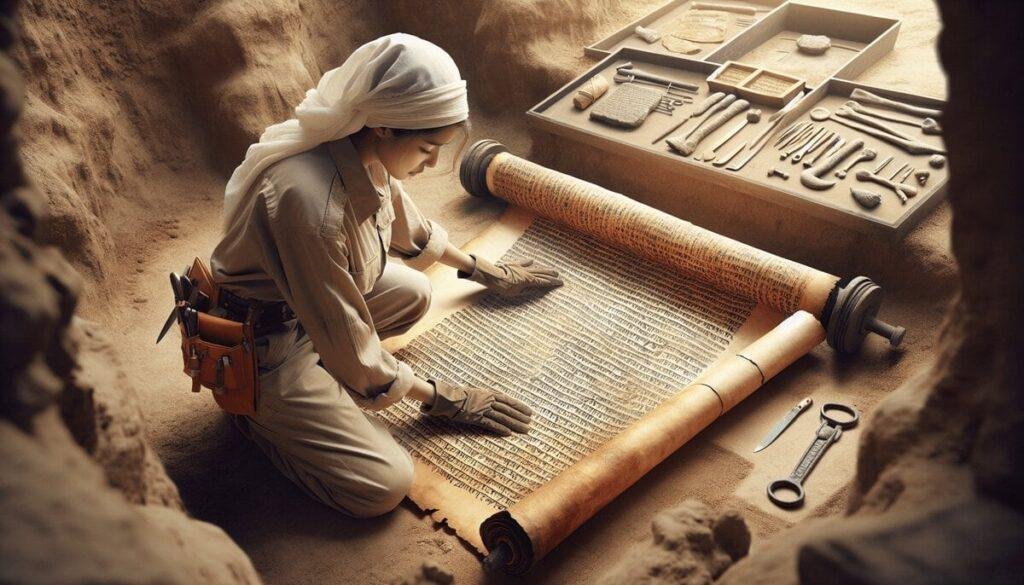Unraveling the Mysteries: Challenges Faced by Biblical Archaeologists explores the formidable hurdles encountered by those dedicated to unearthing the secrets buried within the ancient biblical world. With a tone of friendly curiosity, this article delves into the unique obstacles faced by these archaeologists as they navigate the past, seeking to uncover concrete evidence that sheds light on the history and stories enshrined in religious texts. From the limitations of time and resources to the complex nature of interpretation, this paragraph provides a captivating introduction to the fascinating and challenging world of biblical archaeology.
Lack of Physical Evidence
Scarcity of artifacts
Biblical archaeologists often face the challenge of a scarcity of artifacts directly linked to biblical events or figures. This scarcity may be due to a variety of factors, such as the passage of time, natural decay, and human activity. As a result, archaeologists must rely on limited physical evidence to make conclusions about the past.
Destruction of archaeological sites
Another challenge faced by biblical archaeologists is the destruction of archaeological sites. These sites may be targeted by looters seeking valuable artifacts or by individuals or groups with different agendas. Sadly, the loss of these sites means the loss of potential knowledge and insights into ancient biblical societies.
Inaccessibility of certain regions
Certain regions mentioned in the Bible, such as ancient Mesopotamia or Egypt, may currently be politically unstable or inaccessible due to ongoing conflicts or geopolitical tensions. This poses a significant challenge for archaeologists, as they are unable to physically access these areas to conduct excavations and gather necessary data.
Historical Accuracy
Lack of written records
One of the major challenges faced by biblical archaeologists is the lack of comprehensive written records from the ancient biblical times. While the Bible serves as an invaluable source of information, there are gaps in historical records that make it difficult to establish a complete and accurate picture of the past.
Inconsistent biblical accounts
In addition to the lack of written records, biblical archaeologists also face the challenge of inconsistent accounts within the Bible itself. Different books and passages may describe events or individuals in varying ways, making it difficult to determine which accounts are historically accurate and which are metaphorical or theological in nature.
Reliability of biblical texts
The reliability of biblical texts is a topic of ongoing debate among scholars. Questions regarding authorship, translations, and potential modifications over time contribute to the challenge of determining the historical accuracy of the Bible. As such, biblical archaeologists must carefully consider the reliability of the texts they use as sources.

Interpretation and Bias
Subjectivity in interpretation
Interpreting the archaeological evidence related to biblical sites and events requires careful analysis, as it is subject to individual interpretation. Different researchers may come to different conclusions based on the same evidence, contributing to the challenges faced by biblical archaeologists in achieving a consensus on certain historical aspects.
Religious and cultural biases
The field of biblical archaeology is often influenced by religious and cultural biases. Researchers with specific religious backgrounds may approach their work differently, potentially impacting the way they interpret and present their findings. It is crucial for biblical archaeologists to remain aware of these biases and strive for objectivity in their research.
Confirmation bias
Confirmation bias, the tendency to seek or interpret evidence in a way that supports pre-existing beliefs, can also pose a challenge to biblical archaeologists. Researchers may unintentionally focus on evidence that confirms their expectations or theories, potentially disregarding contradictory evidence. Overcoming confirmation bias is essential for achieving unbiased and scientifically valid conclusions.
Dating Techniques
Limited dating methods
Dating archaeological sites and artifacts accurately is crucial for understanding the past. However, biblical archaeologists face the challenge of limited dating methods for determining the age of certain objects or sites. This limitation can impact the ability to establish a reliable chronology and understand the historical context of biblical events.
Difficulties in establishing chronology
The chronological sequencing of events is fundamental to reconstructing the history of biblical times. However, establishing an accurate and comprehensive chronology can be challenging due to gaps in the archaeological records and the complexity of the ancient world. Biblical archaeologists must employ various dating techniques and cross-reference different sources to overcome these obstacles.
Reliability of carbon dating
Carbon dating, a commonly used technique for determining the age of organic materials, is not without its limitations. The reliance on carbon dating can be problematic when it comes to biblical archaeology, as it is only effective for materials up to around 50,000 years old. For older artifacts or sites, alternative dating methods must be used or estimated based on other evidence.

Controversial Discoveries
Debates over religious claims
Biblical archaeology often intersects with religious beliefs and teachings, leading to debates or controversies over the interpretation of discoveries. Certain findings may challenge established religious narratives or contradict long-held beliefs, resulting in disputes between scholars, religious authorities, and communities.
Political implications
Discoveries related to biblical archaeology can have political implications, particularly in regions where religious and national identities are closely intertwined. Competing claims to heritage and territory can complicate the interpretation and public presentation of archaeological findings, adding another layer of complexity to the work of biblical archaeologists.
Ethical considerations
The ethical considerations surrounding biblical archaeology are also significant. Archaeologists must navigate the potential consequences of their work, including the impact on local communities, the proper handling and preservation of sensitive artifacts, and the repatriation of cultural heritage to their countries of origin. These considerations require a thoughtful and responsible approach to the study of biblical archaeology.
Linguistic Challenges
Deciphering ancient languages
Ancient texts and inscriptions often play a crucial role in biblical archaeology, but they are often written in languages that are no longer spoken or understood. Deciphering ancient languages, such as Hebrew, Aramaic, or ancient Egyptian, presents a significant challenge to biblical archaeologists. Scholars with expertise in linguistics and ancient languages work tirelessly to translate and interpret these texts.
Ambiguity in translations
Even when ancient texts are deciphered, there can still be challenges in translating them accurately. Interpretations of specific words or phrases may vary, leading to different understandings of the original meaning. The ambiguity inherent in translating ancient languages adds another layer of complexity and potential subjectivity to the interpretation of biblical texts.
Language evolution
Languages are not static; they evolve over time. The ancient languages spoken during biblical times have evolved or gone extinct, leading to changes in grammar, syntax, and vocabulary. This language evolution poses a challenge for biblical archaeologists as they attempt to reconcile modern language structures with the ancient texts they are studying.
Lack of Funding and Resources
Limited financial support
Biblical archaeology requires significant financial resources to conduct excavations, support research teams, and preserve and protect artifacts. However, funding for archaeological projects can be limited, with priorities often given to other areas of research or public interest. This lack of financial support presents a major challenge for biblical archaeologists, affecting their ability to carry out their work effectively.
Insufficient manpower
The excavation and analysis of archaeological sites is a labor-intensive and time-consuming process. Unfortunately, there is often a lack of sufficient manpower and trained staff available for biblical archaeological projects. The shortage of skilled professionals in the field hinders progress and slows down the pace at which new discoveries can be made.
Lack of technological advancements
Advancements in technology can greatly enhance the work of biblical archaeologists, from high-resolution imaging techniques to advanced dating methods. However, the lack of technological advancements specific to the field of biblical archaeology poses challenges in terms of efficiency, accuracy, and the ability to access and analyze data. Limited access to cutting-edge technology restricts the potential for groundbreaking discoveries.
Ethical Responsibilities
Preservation of cultural heritage
Preserving the cultural heritage of the areas in which biblical archaeologists work is of utmost importance. It is crucial for researchers and archaeologists to adopt responsible practices that prioritize the preservation and protection of artifacts, archaeological sites, and cultural landscapes. Balancing the need for excavation and research with the long-term preservation of cultural heritage is an ongoing challenge.
Negotiating with local communities
Successful biblical archaeological projects require collaboration and communication with local communities. Archaeologists must engage in meaningful dialogue and negotiate with local stakeholders to gain their support and address concerns. This includes considering the impact of research on the local community, recognizing their rights and interests, and involving them in decision-making processes.
Repatriation of artifacts
The issue of repatriation arises when biblical artifacts or cultural heritage from archaeological sites are removed from their countries of origin. Biblical archaeologists face the ethical responsibility of working towards the repatriation of artifacts to their rightful homes. This includes considering the socioeconomic, political, and cultural implications of repatriation and engaging in open and transparent discussions with relevant authorities.
Political and Social Instability
War and conflict
Political instability, including armed conflicts and wars, can have a devastating impact on biblical archaeological sites and hinder ongoing research. Sites may be damaged or destroyed, making it difficult to gather data or conduct further excavations. Additionally, the safety of researchers is compromised in regions affected by violence, making it challenging to carry out fieldwork.
Restricted access due to political reasons
In some cases, political reasons and regional tensions result in restricted access to biblical archaeological sites. Governments or authorities may impose limitations or deny permits for excavations or research. These restrictions can significantly hamper the ability of biblical archaeologists to explore and study important sites, hindering progress in the field.
Social unrest and safety concerns
Social unrest and instability within local communities can pose a risk to biblical archaeologists. Protests, conflicts, or other forms of social unrest can impact the safety and security of researchers. These challenges arise when working in areas where tensions exist or where communities may be resistant to archaeologists exploring their heritage.
Collaboration and Communication
Coordinating efforts with multiple stakeholders
Biblical archaeologists often need to coordinate their efforts with multiple stakeholders, including academia, government agencies, religious organizations, and local communities. Balancing the interests and priorities of these diverse groups can be challenging and requires effective communication, negotiation, and collaboration to ensure that research is conducted in a mutually beneficial and responsible manner.
Sharing information and findings
Effective communication and the sharing of information and findings are crucial in any scientific field, including biblical archaeology. However, this can be challenging due to factors such as language barriers, the competitive nature of academic research, and limited resources for publishing and disseminating research findings. Overcoming these challenges is vital to ensure the progress and advancement of biblical archaeology.
Language barriers
Biblical archaeologists often work in regions where the local language may differ from their own, leading to language barriers. Communication and collaboration become more challenging when researchers need to rely on translators or interpreters. Language barriers may impede the exchange of knowledge and ideas, making effective communication and collaboration more difficult.
In conclusion, biblical archaeologists face numerous challenges in their work. From a lack of physical evidence and historical accuracy to interpretation and bias issues, dating techniques, and controversial discoveries, each aspect presents its own set of hurdles. Furthermore, limitations in funding and resources, ethical responsibilities, political and social instability, linguistic challenges, and the need for collaboration and communication require careful navigation. Despite these challenges, biblical archaeologists strive to unravel the mysteries of the past, preserving cultural heritage and contributing to our understanding of ancient biblical societies.





